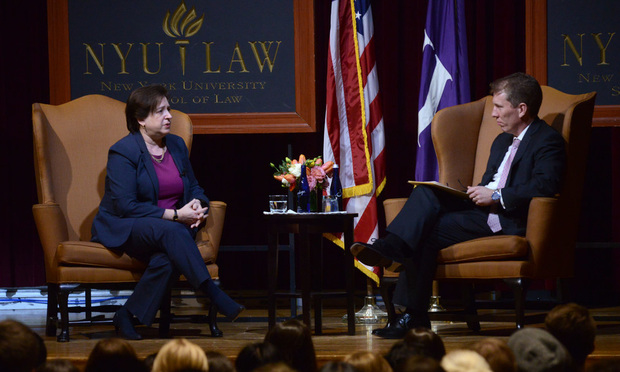Kagan Says She'll 'Take Into Account' Whether Judges Follow New Clerk Hiring Plan
U.S. Supreme Court Justice Elena Kagan recently threw her support behind a hiring plan developed by the Ad Hoc Committee on Law Clerk Hiring—a committee which includes Ninth Circuit Chief Judge Sidney Thomas.
May 07, 2018 at 01:45 PM
5 minute read
The original version of this story was published on National Law Journal
 U.S. Supreme Court Justice Elena Kagan (2015). Credit: Diego M. Radzinschi / ALM
U.S. Supreme Court Justice Elena Kagan (2015). Credit: Diego M. Radzinschi / ALM U.S. Supreme Court Justice Elena Kagan recently threw her support behind the new law clerk hiring plan by saying she will “take into account” in her own hiring whether judges and law schools comply with the new process.
Kagan described the chaos surrounding the former hiring process and her support for the two-year pilot plan during remarks April 30 at the annual meeting of the 7th Circuit Bar Association and Judicial Conference of the Seventh Circuit in Chicago. Her comments were confirmed by the U.S. Supreme Court's public information office.
Trevor Morrison, dean of New York University School of Law, called the justice's support “tremendously significant.” He added, “I think it's likely to be influential that a member of the Supreme Court would express support in the way Justice Kagan has.”
Kagan's message for her own chambers is likely to be heard coast to coast. In her nearly eight years on the high court, Kagan has hired clerks largely from the D.C. Circuit but also from the Fourth, Sixth and Ninth Circuits and from judges across the ideological spectrum.
A former Harvard Law School dean and professor, Kagan is in a position to understand the effect on students of the former hiring process in which first-year students faced pressure to make clerkship commitments and law professors make recommendations “on less and less information,” Morrison said.
The new hiring plan is the product of the Ad Hoc Committee on Law Clerk Hiring, whose members are Chief Judges Merrick Garland of the D.C. Circuit; Robert Katzmann of the Second Circuit; Sidney Thomas of the Ninth Circuit and Diane Wood of the Seventh Circuit. The plan is similar to one that was discontinued in 2014 because of lack of support. The new plan, according to the four judges, has garnered “substantial support” among federal judges.
The plan, announced in February, provides that, starting with students who entered law school in 2017, the application and hiring process will not begin until after a law student's second year. Judges will not seek or accept formal or informal clerkship applications, seek or accept formal or informal recommendations, conduct formal or informal interviews, or make formal or informal offers before June 17, 2019.
For students who entered law school in 2017, the starting date will be June 17, 2019. For those who enter in 2018, the starting date will be June 15, 2020.
Under the plan, a judge who makes a clerkship offer will keep it open for at least 48 hours, during which time the applicant will be free to interview with other judges. This is a two-year pilot plan that participating judges will reconsider after June 2020.
Morrison said the four chief judges deserve “a great deal of credit” for the plan. Each of their circuit courts, he added, has made a public statement of intent to operate within the plan.
Morrison and Yale Law School Dean Heather Gerken spearheaded a letter in September endorsing efforts to move the clerkship hiring to a date after the completion of students' second year. The letter was signed by more than 100 law school deans.
The deans' concerns about the hiring process over the last several years included:
—Clerkship decisions that are based solely on the first year pose difficulties of laying foundations of a legal education and encouraging exploration.
—Accelerated hiring places at a disadvantage students who are first in their families to go to college, first-generation professionals, or simply those in need of some time to master the art of lawyering. “Students without professional networks may arrive not knowing what a clerkship is, let alone how to attain one,” the deans said.
—The accelerated hiring prevents law schools from providing judges “with the information they need to make wise hiring choices.”
Gerken told The National Law Journal in December that the competition for clerks under the current plan “has had a dramatic effect on our pedagogy. It makes the first year more important than it should be. Some students need a longer runway. The late bloomers don't get a fair shot.”
 Elena Kagan speaks with NYU Law School Dean Trevor Morrison in 2016. Credit: Rick Kopstein/ ALM
Elena Kagan speaks with NYU Law School Dean Trevor Morrison in 2016. Credit: Rick Kopstein/ ALM The next two months are key to seeing whether judges will refrain from some interviewing and hiring, Morrison said. “The issue is ripe right now,” he added.
Although he believes there is increasing support for the new plan, Morrison said it would not be fair to say that every chief judge has announced his or her circuit intends to follow it.
“At the end of the day, these hiring decisions aren't done at the circuit-level or trial court-level but at the judge-level,” Morrison said. He said he hoped statements of support from influential judges, such as Kagan, will have an impact.
Read more:
Urged by Law School Deans, Federal Judges Revamp Clerk Hiring
Who Are the Supreme Court's Biggest Feeder Judges?
Shut Out: SCOTUS Law Clerks Still Mostly White and Male
The Select 75: A Portrait of Merrick Garland's Law Clerks
Kagan: Law Schools Must Do More to Boost Student Writing Skills
This content has been archived. It is available through our partners, LexisNexis® and Bloomberg Law.
To view this content, please continue to their sites.
Not a Lexis Subscriber?
Subscribe Now
Not a Bloomberg Law Subscriber?
Subscribe Now
NOT FOR REPRINT
© 2025 ALM Global, LLC, All Rights Reserved. Request academic re-use from www.copyright.com. All other uses, submit a request to [email protected]. For more information visit Asset & Logo Licensing.
You Might Like
View All
Buchalter Hires Longtime Sheppard Mullin Real Estate Partner as Practice Chair

Reality TV Couple and Pacific Palisades Neighbors Sue City of Los Angeles Over Loss of Homes to Fire
3 minute read
In Resolved Lawsuit, Jim Walden Alleged 'Retaliatory' Silencing by X of His Personal Social Media Account

No Two Wildfires Alike: Lawyers Take Different Legal Strategies in California
5 minute readTrending Stories
Who Got The Work
J. Brugh Lower of Gibbons has entered an appearance for industrial equipment supplier Devco Corporation in a pending trademark infringement lawsuit. The suit, accusing the defendant of selling knock-off Graco products, was filed Dec. 18 in New Jersey District Court by Rivkin Radler on behalf of Graco Inc. and Graco Minnesota. The case, assigned to U.S. District Judge Zahid N. Quraishi, is 3:24-cv-11294, Graco Inc. et al v. Devco Corporation.
Who Got The Work
Rebecca Maller-Stein and Kent A. Yalowitz of Arnold & Porter Kaye Scholer have entered their appearances for Hanaco Venture Capital and its executives, Lior Prosor and David Frankel, in a pending securities lawsuit. The action, filed on Dec. 24 in New York Southern District Court by Zell, Aron & Co. on behalf of Goldeneye Advisors, accuses the defendants of negligently and fraudulently managing the plaintiff's $1 million investment. The case, assigned to U.S. District Judge Vernon S. Broderick, is 1:24-cv-09918, Goldeneye Advisors, LLC v. Hanaco Venture Capital, Ltd. et al.
Who Got The Work
Attorneys from A&O Shearman has stepped in as defense counsel for Toronto-Dominion Bank and other defendants in a pending securities class action. The suit, filed Dec. 11 in New York Southern District Court by Bleichmar Fonti & Auld, accuses the defendants of concealing the bank's 'pervasive' deficiencies in regards to its compliance with the Bank Secrecy Act and the quality of its anti-money laundering controls. The case, assigned to U.S. District Judge Arun Subramanian, is 1:24-cv-09445, Gonzalez v. The Toronto-Dominion Bank et al.
Who Got The Work
Crown Castle International, a Pennsylvania company providing shared communications infrastructure, has turned to Luke D. Wolf of Gordon Rees Scully Mansukhani to fend off a pending breach-of-contract lawsuit. The court action, filed Nov. 25 in Michigan Eastern District Court by Hooper Hathaway PC on behalf of The Town Residences LLC, accuses Crown Castle of failing to transfer approximately $30,000 in utility payments from T-Mobile in breach of a roof-top lease and assignment agreement. The case, assigned to U.S. District Judge Susan K. Declercq, is 2:24-cv-13131, The Town Residences LLC v. T-Mobile US, Inc. et al.
Who Got The Work
Wilfred P. Coronato and Daniel M. Schwartz of McCarter & English have stepped in as defense counsel to Electrolux Home Products Inc. in a pending product liability lawsuit. The court action, filed Nov. 26 in New York Eastern District Court by Poulos Lopiccolo PC and Nagel Rice LLP on behalf of David Stern, alleges that the defendant's refrigerators’ drawers and shelving repeatedly break and fall apart within months after purchase. The case, assigned to U.S. District Judge Joan M. Azrack, is 2:24-cv-08204, Stern v. Electrolux Home Products, Inc.
Featured Firms
Law Offices of Gary Martin Hays & Associates, P.C.
(470) 294-1674
Law Offices of Mark E. Salomone
(857) 444-6468
Smith & Hassler
(713) 739-1250






